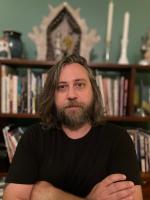Now, Hours Later
I wanted my wife to snap
a quick pic of me sprawled out
beside her on the lawn.
It seemed like an opportunity
to get a good shot.
Legs stretched. Booted feet
crossed. Hands tucked
behind my head, tilting the grey
Carhartt hat
down over my eyes to block what
sun there was. The latest
Best American Poetry
open face-down on my chest.
I wanted her to snap
the pic, but I didn’t want to say it.
Not only because I wanted her
to think I was asleep. I also
wanted her to know, somewhere
in her beautiful blood—
this seems like an opportunity
to get a good shot.
Quarantine—the pithy Instagram
caption could read,
or maybe The Poet Dozes Away
Another Apocalypse.
What I’m really trying to say,
or not say, is that
I didn’t want a single word
to fall out of my mouth or hers.
I just wanted
something to happen—to fall
naturally into place.
We’re not talking anyway. Not
about anything other
than COVID-19 anyway—
singing its monstrous aria,
or trying to, over the sui generis
notes of spring, which is
why I was on the lawn (I tell
only myself) in the first place.
I had to face the facts. Yesterday
was the first day
of spring. And last night brought
the first spring rain.
Before my wife sat beside me
on the lawn, she was
on the porch, enjoying the light
wind holding her—a kind
of triage for what the wind might
prescribe in coming months.
But when she saw me she came
down—brought her
computer, textbook, and papers
to the damp grass.
I still don’t know if she snapped
a pic on her phone—of me
pretending to sleep. I’ll ask her
when we’re talking again
about anything that resembles
anything again.
Now, hours later, seems like days.
She’s on the phone
with her brother, checking in
to see how his business in Maine
is faring against the virus.
They spend a long time talking
about the repeated failures
of their father and older brother
to make amends.
Then my wife mentions
their grandfather, a WWII hero.
He was someone, she says,
who saw the end
of the world, then lived past it.
Now it’s raining again—harder
somehow, because Mark,
our neighbor and friend, is back
from visiting his mother
at the hospital. I wonder
if it’s safe to be around him
now—now as I’m reading a text
he just sent, about
rethinking our buddy status
during quarantine.
I wonder what iniquity will mean
tomorrow, the third day
of spring. I wonder
if my wife will snap, or me.
Try not to think of the word when.
It’s raining harder now. I need
to brave the store
for bread and beer. First I’ll move
the box of sidewalk chalk
from the driveway.
I don’t want to ruin one
of our daughter’s distractions.
Her sun is already a yellow smear
across the concrete—
a broken yoke left to gather
an army of ants—
and I’m no war hero.

Christopher Shipman (he/him) lives on Eno, Sappony, & Shakori land in Greensboro, NC, where he teaches literature & creative writing at New Garden Friends School & plays drums in the rock band The Goodbye Horses. Recent work appears or is forthcoming in Fence, Poetry, the Southern Review, & elsewhere. His experimental play Metaphysique D’ Ephemera has been staged at four universities. He was a recent finalist for a Courage to Write grant from the de Groot Foundation and a recent nominee for a Pushcart. Getting Away with Everything (Unlikely Books, 2021), in collaboration with Vincent Cellucci, is his most recent collection. More at www.cshipmanwriting.com.


